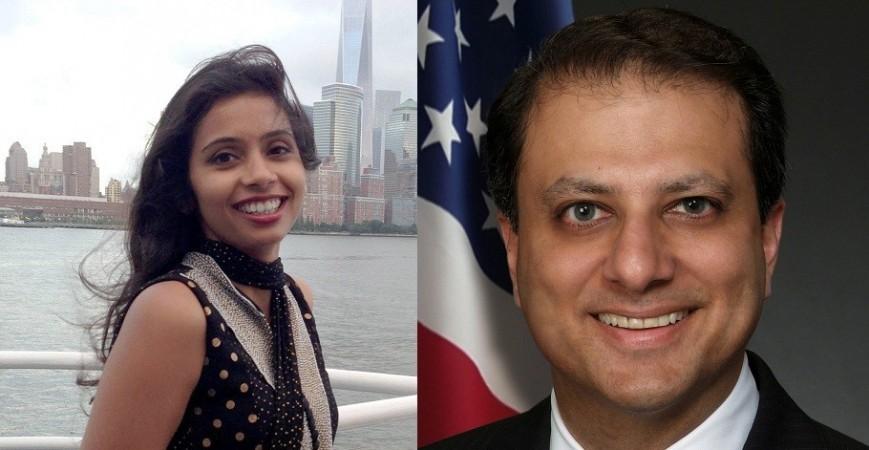
While the arrest of Devyani Khobragade is turning uglier every passing day with the US resolute on persecuting the diplomat, there seems to be no respite for questions on whether the entire issue could be seen as an absolute prejudicial treatment towards Indians.
New questions have begun emerging on why an Indian diplomat was arrested and meted out with humiliating treatment on a petty crime of underpaying a nanny, while the US did not dare to touch 49 Russian diplomats of similar stature who were reportedly apprehended for a high-profile 'Medicaid fraud', in which the highly placed diplomats and their wives used $1.5 million medical aid from the US government that they were not entitled for.
It cannot be said with certainity if it was a sheer chance or a well orchestrated plan to have Devyani arrested, only a week after it was evident that the Russian diplomats posted to New York City and their wives were accused of fraudulently applying for Medicaid benefits over the past nine years; an incident that Preet Bharara, the US attorney in Manhatten, went to the extent of calling "picking pockets in the host country."
The most important aspect of the story lies on what actually the US did to those diplomats who fraudulently availed federal health benefits program designed only for the needy and poor? It is perhaps not surprising any more that they did nothing to them for the simple reason that they were Russians. The US has a long history of being non-confrontational with Russia which still poses Cold War era threats to the country. So the question can thus be asked: Would Devyana Khobragade be arrested, handcuffed and strip-searched if she was a Russian?
The fraudulent practice of Russian diplomats was reported on 5 December, making quick headlines in the US mainstream press with the issue quickly fading like nothing happened. Mr. Bharara's news briefing was not even followed by an appearance of the defendants in court and none of those 49 fraudulent Russian diplomats' faces were shown.
Mr. Bharara candidly said that his office had been "advised" that the defendants all had "diplomatic immunity", and so none had been arrested. All that Mr. Bharara reportedly did was to follow the policy that required the departure of those individuals from the United States, the New York Times reported when the news first appeared.
Much to the dismay of several Indians, and to the contrary of what they did to the Russians, Khobragade was arrested by the US Department of State's Diplomatic Security Service in broad daylight at around 9:30am on 12 December after dropping off her daughters at school on 97th Street, Manhattan, New York. After her arrest, she was reportedly handcuffed, strip-searched, DNA swabbed and subjected to a cavity search. She was released at 4pm at the same day on a $250,000 bond after pleading not guilty and surrendering her passport.
The US would not have dared even touching the Russian diplomats while the Indian diplomat was not only handled with utmost indignity but was also denied the diplomatic immunity that she should have enjoyed like the Russian diplomats. US alleged that she had only "Consular immunity" and she is liable to be prosecuted, much to the outrage of New Delhi.
"The U.S. would not have dared to arrest a Chinese or Russian diplomat for a trifling offense, such as underpayment to a nanny," Brahma Chellaney, a well known geostrategist based in New Delhi said on a Facebook post.
"True, as a consulate-based diplomat, Khobragade enjoyed only limited diplomatic immunity under the 1963 Vienna Convention on Consular Relations. But this convention guarantees freedom from detention until trial and conviction, except for 'grave offenses.' Can a wage dispute qualify as a 'grave offense' warranting arrest and humiliation? Would the US tolerate similar treatment of one of its consular officers?" Chellaney said in an opinion piece in Project Syndicate.
The social networking site has begun flooding with the new perspective of looking at Khobragate story in comparison with the Russian diplomats' fraud.
"As if this wasn't enough, they are planning to construe this as an act of human trafficking; in order to bring it within the exception of 'grave crime'. Surreal," Avin Chhangani responded to Chellaney's Facebook post.
"Why is stupid Indian media not questioning Americans on Russian diplomats' Medicaid fraud?" asked Sree Reddy responding to the post.
With the Khobragate incident threatening to pose a serious political rift between India and the US, the fact that the Indian diplomat was treated with prejudice in contrast to the Russian diplomats would be enough to underline the crippled US attitude towards Indians in general. Is there even a semblance of explanation that the US can give to this?

















